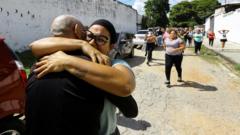Venezuelan authorities have announced the release of over 100 individuals who were arrested in the aftermath of July's disputed presidential elections. This move has been confirmed by Alfredo Romero, the director of the local rights group, Foro Penal, who indicated that the organization has verified the release of 107 political prisoners tied to the unrest following the contested elections.
Post-election tensions peaked when President Nicolás Maduro, whose administration faced allegations of electoral fraud, was declared the winner with 52% of the vote compared to 43% for opposition candidate Edmundo González. This declaration was met with widespread skepticism both in Venezuela and globally, as many in the international community, including rights organizations, rejected the legitimacy of the electoral process.
Subsequent to the election, mass protests erupted throughout the country, leading to the arrest of over 1,800 individuals. Human Rights Watch reported that numerous demonstrators faced serious charges, including terrorism and incitement. The released prisoners were seen leaving four prisons in what appeared to be a moment of celebration, as videos circulated online showed families and supporters welcoming them home.
In September, González fled to Spain, seeking political asylum amid threats to his safety, further complicating the tensions between the Maduro administration and the opposition. The official results published by the National Electoral Council (CNE) sparked additional controversy, as they indicated a discrepancy with claims from the opposition, which provided evidence suggesting González's apparent victory.
Adding to the chaos, claims emerged recently of foreign involvement sought by Maduro's administration, including allegations against the CIA linked to a purported plot against his presidency. The CNE stated that they could not provide detailed voting records due to alleged hacking that corrupted their data. Despite the turbulent political landscape, Maduro is set to begin his third six-year term in January, with the country navigating ongoing unrest and a divided populace.
Post-election tensions peaked when President Nicolás Maduro, whose administration faced allegations of electoral fraud, was declared the winner with 52% of the vote compared to 43% for opposition candidate Edmundo González. This declaration was met with widespread skepticism both in Venezuela and globally, as many in the international community, including rights organizations, rejected the legitimacy of the electoral process.
Subsequent to the election, mass protests erupted throughout the country, leading to the arrest of over 1,800 individuals. Human Rights Watch reported that numerous demonstrators faced serious charges, including terrorism and incitement. The released prisoners were seen leaving four prisons in what appeared to be a moment of celebration, as videos circulated online showed families and supporters welcoming them home.
In September, González fled to Spain, seeking political asylum amid threats to his safety, further complicating the tensions between the Maduro administration and the opposition. The official results published by the National Electoral Council (CNE) sparked additional controversy, as they indicated a discrepancy with claims from the opposition, which provided evidence suggesting González's apparent victory.
Adding to the chaos, claims emerged recently of foreign involvement sought by Maduro's administration, including allegations against the CIA linked to a purported plot against his presidency. The CNE stated that they could not provide detailed voting records due to alleged hacking that corrupted their data. Despite the turbulent political landscape, Maduro is set to begin his third six-year term in January, with the country navigating ongoing unrest and a divided populace.




















